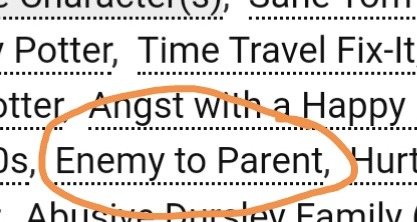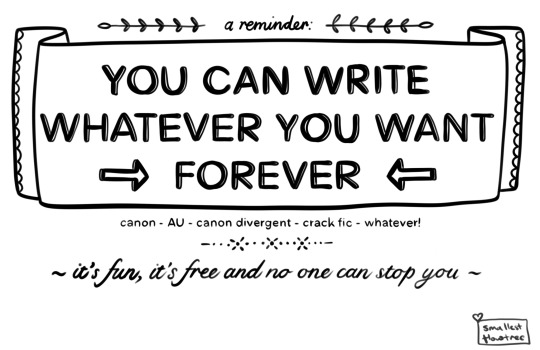Psalm 23 | Child of Godwriter & artist, level 20, ace, this hermit is ready to spread chaos and positive <3
Don't wanna be here? Send us removal request.
Text




choose your (secret) fighter
12K notes
·
View notes
Text
You know what?
I love you, fics that take months to update. I click on the newest chapter and have no memory of this place and get to go back some chapters and rediscover how much i love everything about this story.
I love you, fics that take years to update. I think of you fondly, and know your names, go search for you and see an update from this year and scream, diving in uncaring of any missed details (i will finish the update and read you in reverse because this is a treat you have bestowed)
I love you, fics that probably will never update again. Thank you for being a roman empire for my mind, thank you for teaching me about the ephemeral fandom experience, for inspiring a thousand million what if-s, for being a comfort read and a nostalgia read and a reread.
I love you fic writers, who jump into projects and stories with enthusiasm. I love you when you succeed in pumping out those chapters and that love doesn't go away when you stop.
I love you fic writers who post and then get in your own head and never feel confident enough to update, whether it's at all or whether it's just that one story.
I love you fic writers, who have a fandom or media hurt you to the point of abandoning or having a hard time with their WIPs.
I love you fic writers, who lose interest or have life changes or illness or bad memory. Thank you for being part of the fandom, a core part of the fandom. Thank you for the time spent in the fandom.
I love you, fic writers who try out something new and then stop. You're so valid.
I love you, WIP fics that may or may not ever get finished. Thank you for brightening my day in the way only you could have.
23K notes
·
View notes
Text
Obi-wan is simultaneously the eldest child, middle child, and youngest child.
Eldest because he has HEAVY “eldest daughter syndrome”, has the highest expectations, is tasked with raising his own sibling, acts as his own master’s guardian at times.
Middle because between Xanatos and Anakin, he is left forgotten and unimportant. Treated with less care in comparison.
Youngest because he was the youngest until Anakin came along, his master had already raised 1.5 padawans, and seems to forget that Obi-wan is still a child too. Qui-gon would sometimes forget that he is not the same as the last two padawans.
170 notes
·
View notes
Text
*writes two paragraphs after months of literally nothing and it took three hours*

33K notes
·
View notes
Text

Well put. (Source: Writing About Writing Facebook page)
216K notes
·
View notes
Text
Was scrolling through AO3 and found this gem

Enemy to parent is a trope we have to popularise lmao
74K notes
·
View notes
Text
What to do if you find yourself homless- written by someone who has actually been homeless
Most important: Spend the money you have on a motel. Churches probably will not actually help and shelters can be dangerous or turn you away. At a motel you have free breakfast, access to running water, and a lockable place to sleep. Do not waste money on a gym membership like the popular version of this post says to do, YMCA memberships are like $40.
2. Contact family and friends. Now is not the time to worry about being a burden. Your survival and safety comes first and that is all that matters, anyone worth having in your life will agree.
3. Start a gofundme. Even if someone can’t offer you a place to stay, they might be willing to toss out $5 so you can eat today.
4. Libraries have free wifi. Apply to any and all jobs you can think of if you aren’t already working.
5. Any home is a good home. Even if it’s a dingy apartment in a bad neighborhood. If its cheap and you can afford it, snatch it up.
6. Pancake mix and peanut butter are filling, cheap, and last a long time.
PLEASE SHARE THE FUCK OUT OF THIS
106K notes
·
View notes
Text
“we need more platonic relationships in media” your inability to turn off your shipping brain is a You problem
66K notes
·
View notes
Text

for those who know me, you know that I am a big fan of greek mythology, so when the epic saga by Jorege Rivera-Herrans came out I couldn't help but fall madly in love with it, his music accompanied and inspired me while I was working, and now that this long journey is about to end I couldn't help but leave a tribute to thank him for all the work he has done. he couldn't have left us a better christmas present under the tree! thanks again for everything.
ps: I already know that with the last song I will cry like a fountain!!
17K notes
·
View notes
Text
sometimes you need dialogue tags and don't want to use the same four


#fanfic writing#writing#writing tips#synonyms#for future reference#writing resources#writing reference#writing dialogue
87K notes
·
View notes
Text




Salmon hats: sweeping the nation by storm watercolor on paper, digitally overlaid on photo
6K notes
·
View notes
Text
Look at him just having the funniest of times.
51K notes
·
View notes




